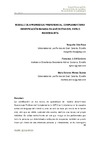Identificador persistente para citar o vincular este elemento:
https://accedacris.ulpgc.es/jspui/handle/10553/41996
| Campo DC | Valor | idioma |
|---|---|---|
| dc.contributor.author | Díaz Roca, Margarita | en_US |
| dc.contributor.author | Gil Cordeiro, Francisco J. | en_US |
| dc.contributor.author | Afonso Suárez, María Dolores | en_US |
| dc.date.accessioned | 2018-09-26T08:08:30Z | - |
| dc.date.available | 2018-09-26T08:08:30Z | - |
| dc.date.issued | 2018 | en_US |
| dc.identifier.issn | 2332-8533 | en_US |
| dc.identifier.uri | https://accedacris.ulpgc.es/handle/10553/41996 | - |
| dc.description.abstract | La identificación de los estilos de aprendizaje del modelo denominado Aprendizaje Preferencial Complementario (APC) se fundamenta en la escucha activa del lenguaje del individuo, esto no solo se hace por medio de la fuente oral, sino que es válida cualquier otra escrita, siempre que nazca del propio individuo. Se utiliza normalmente un test que indaga en las preferencias que tiene la persona por determinados enfoques de respuesta, también se puede hacer por medio de una entrevista personal y, últimamente, se ha investigado la posibilidad de analizar los relatos cortos, todo ello intentando optimizar el método de identificación en función de la circunstancia de acceso a la persona. En este trabajo se explica cómo analizar una anécdota de un alumno con estilo Racionalista, basándose en la estructura de la anécdota, el vocabulario específico del estilo y la dimensión del tema tratado. Se compara con un escritor reconocido que presenta el mismo estilo y se concluye con los criterios que permiten verificar este estilo para cualquier otro individuo que lo presente. | en_US |
| dc.description.abstract | The identification of the learning styles of the model called Preferential Complementary Learning (PCL) is based on the active listening of each individual's language, this is not only done through the oral source, but is valid any other written one, as long as it is from the individual himself. It is usually used a test that enquires into the preferences that the person has for certain response approaches, it can also be done through a personal interview and, lately, the possibility of analyzing their short stories has been investigated. The aim of these approaches is try to optimize the method of identification depending on how the access to the person is. This paper explain how to analyze the anecdote of a student with the Rationalist style, based on the structure of the anecdote, the specific vocabulary of the style and the dimension of the subject. Then it is compared with a recognized writer who presents the same style and concludes with the criteria that allow verifying this style for any other individual who presents it. | en_US |
| dc.language | spa | en_US |
| dc.publisher | 2332-8533 | |
| dc.relation.ispartof | Revista de estilos de aprendizaje = Journal Of Learning Styles | en_US |
| dc.source | Journal of Learning Styles [ISSN 2332-8533], v. 11 (21), p. 176-208 | en_US |
| dc.subject | 58 Pedagogía | en_US |
| dc.subject.other | Estilos de aprendizaje | en_US |
| dc.subject.other | Indicador de estilo de aprendizaje | en_US |
| dc.subject.other | Estilo racionalista | en_US |
| dc.subject.other | Metodología de aprendizaje | en_US |
| dc.subject.other | Ciclo de aprendizaje | en_US |
| dc.subject.other | Learning style | en_US |
| dc.subject.other | Learning style indicator type | en_US |
| dc.subject.other | Rationalist style | en_US |
| dc.subject.other | Apprenticeship methodology | en_US |
| dc.subject.other | Apprenticeship cycle | en_US |
| dc.title | Modelo de aprendizaje preferencial complementario: identificación basada en anécdotas del estilo racionalista | en_US |
| dc.title.alternative | Preferential complementary learning model: identification based on anecdotes of the rationalist style | en_US |
| dc.type | info:eu-repo/semantics/Article | en_US |
| dc.type | Article | en_US |
| dc.identifier.isi | 000437368900007 | - |
| dc.description.lastpage | 208 | en_US |
| dc.identifier.issue | 21 | - |
| dc.description.firstpage | 176 | en_US |
| dc.relation.volume | 11 | en_US |
| dc.investigacion | Artes y Humanidades | en_US |
| dc.type2 | Artículo | en_US |
| dc.contributor.daisngid | 9652556 | - |
| dc.contributor.daisngid | 6608367 | - |
| dc.contributor.daisngid | 4804908 | - |
| dc.utils.revision | Sí | en_US |
| dc.contributor.wosstandard | WOS:Roca, MD | - |
| dc.contributor.wosstandard | WOS:Cordeiro, FJG | - |
| dc.contributor.wosstandard | WOS:Suarez, MDA | - |
| dc.date.coverdate | Primavera 2018 | en_US |
| dc.identifier.ulpgc | Sí | en_US |
| dc.description.esci | ESCI | |
| dc.description.dialnetimpact | 0,0 | |
| dc.description.dialnetq | Q2 | |
| dc.description.dialnetd | D3 | |
| dc.description.erihplus | ERIH PLUS | |
| item.fulltext | Con texto completo | - |
| item.grantfulltext | open | - |
| crisitem.author.dept | GIR SIANI: Inteligencia Artificial, Redes Neuronales, Aprendizaje Automático e Ingeniería de Datos | - |
| crisitem.author.dept | IU de Sistemas Inteligentes y Aplicaciones Numéricas en Ingeniería | - |
| crisitem.author.dept | Departamento de Informática y Sistemas | - |
| crisitem.author.orcid | 0000-0003-3619-5754 | - |
| crisitem.author.orcid | 0000-0003-2811-0319 | - |
| crisitem.author.parentorg | IU de Sistemas Inteligentes y Aplicaciones Numéricas en Ingeniería | - |
| crisitem.author.fullName | Díaz Roca, Margarita | - |
| crisitem.author.fullName | Afonso Suárez, María Dolores | - |
| Colección: | Artículos | |
Visitas 5
239
actualizado el 10-ene-2026
Descargas
78
actualizado el 10-ene-2026
Google ScholarTM
Verifica
Comparte
Exporta metadatos
Los elementos en ULPGC accedaCRIS están protegidos por derechos de autor con todos los derechos reservados, a menos que se indique lo contrario.
